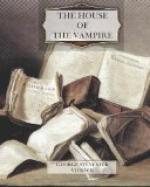“What are you planning to do?”
“My play—I am sure now that it is mine—I cannot take from him; that is irretrievably lost. He has read it to his circle and prepared for its publication. And, no matter how firmly convinced you or I may be of his strange power, no one would believe our testimony. They would pronounce us mad. Perhaps we are mad!”
“No; we are not mad; but it is mad for you to stay here,” she asserted.
“I shall not stay here one minute longer than is absolutely essential. Within a week I shall have conclusive proof of his guilt or innocence.”
“How will you go about it?”
“His writing table—”
“Ah!”
“Yes, perhaps I can discover some note, some indication, some proof—”
“It’s a dangerous game.”
“I have everything to gain.”
“I wish I could stay here with you,” she said. “Have you no friend, no one whom you could trust in this delicate matter?”
“Why, yes—Jack.”
A shadow passed over her face.
“Do you know,” she said, “I have a feeling that you care more for him than for me?”
“Nonsense,” he said, “he is my friend, you, you—immeasurably more.”
“Are you still as intimate with him as when I first met you?”
“Not quite; of late a troubling something, like a thin veil, seems to have passed between us. But he will come when I call him. He will not fail me in my hour of need.”
“When can he be here?”
“In two or three days.”
“Meanwhile be very careful. Above all, lock your door at night.”
“I will not only lock, but barricade it. I shall try with all my power to elucidate this mystery without, however, exposing myself to needless risks.”
“I will go, then. Kiss me good-bye.”
“May I not take you to the car?”
“You had better not.”
At the door she turned back once more. “Write me every day, or call me up on the telephone.”
He straightened himself, as if to convince her of his strength. Yet when at last the door had closed behind her, his courage forsook him for a moment. And, if he had not been ashamed to appear a weakling before the woman he loved, who knows if any power on earth could have kept him in that house where from every corner a secret seemed to lurk!
There was a misgiving, too, in the woman’s heart as she left the boy behind,—a prey to the occult power that, seeking expression in multiple activities, has made and unmade emperors, prophets and poets.
As she stepped into a street car she saw from afar, as in a vision, the face of Reginald Clarke. It seemed very white and hungry. There was no human kindness in it—only a threat and a sneer.
XXVI
For over an hour Ernest paced up and down his room, wildly excited by Ethel’s revelations. It required an immense amount of self-control for him to pen the following lines to Jack: “I need you. Come.”




